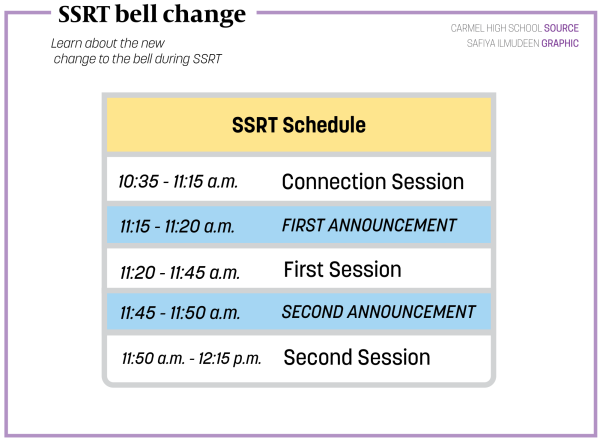The recent modification to this school’s bell schedule during Student Support Resource Time (SSRT) has left many students questioning both its purpose and implementation. The CHS Administrators have added two new bells: one at 11:20 a.m. and another at 11:50 a.m.
The addition of these new bells appears entirely redundant. Students already have clear expectations to arrive at their SSRT locations promptly following the existing bells at 11:15 a.m. and 11:45 a.m. Adding another bell five minutes after the sessions start serves no practical purpose. This change creates a “grace period” that undermines the very punctuality it claims to enforce. Rather than encouraging students to respect the original bell schedule, it normalizes lateness by creating an official five-minute buffer. This mixed messaging confuses rather than clarifies expectations.

More concerning than the redundancy is the administration’s failure to clearly communicate the reasoning behind this change. What specific problem prompted this solution? Was there data showing widespread tardiness during SSRT transitions between sessions?
The student body deserves transparency about decisions impacting their daily schedule. Without proper explanation, the new bells appear to be an arbitrary change rather than a thoughtful response to a genuine issue. If hallway congestion or transition efficiency was the concern, administrators should have shared these problems and invited student input before implementing a solution. Students aren’t opposed to change when it serves a clear purpose, but administrative decisions made without explanation evolve into unnecessary resentment and non-compliance.
Along with this, another major flaw of this policy is how it affects seniors in the Transition to College Program (TCP). If TCP seniors are in the building during SSRT times, then they will be required to be in a classroom during the designated sessions. This not only limits a privilege seniors have been given, but it also disrupts schedules. One of the benefits of being on TCP is more freedom during your releases. Many TCP seniors see their teachers at times more convenient for both the student and the teacher. These times were previously not restricted to academic sessions, and now less flexibility is given to TCP seniors.
We understand there is a good intent behind this new bell schedule; however, it seems to be applied selectively. For example, one day a student may leave their class outside of the designated times and not be reprimanded for it. Another student may do the same and an administrator will discipline them for it. This selective application is leading to more harm than good and needs to be changed. If the intent behind this policy is to eliminate people from roaming the halls, then there needs to be a better way to enforce that.
Overall, this new bell schedule is punishing the many for the actions of a few. The policy creates a new redundant bell schedule that has no real impact and showcases a clear lack of transparency when it comes to communicating with students. The negative impacts of selective application and the effect on TCP seniors are key flaws within this policy. We recommend the administration remove or revise this policy to still limit the number of people roaming but in a more efficient and effective way.


































![AI in films like "The Brutalist" is convenient, but shouldn’t take priority [opinion]](https://hilite.org/wp-content/uploads/2025/02/catherine-cover-1200x471.jpg)










































![Review: “The Immortal Soul Salvage Yard:” A criminally underrated poetry collection [MUSE]](https://hilite.org/wp-content/uploads/2025/03/71cju6TvqmL._AC_UF10001000_QL80_.jpg)
![Review: "Dog Man" is Unapologetically Chaotic [MUSE]](https://hilite.org/wp-content/uploads/2025/03/dogman-1200x700.jpg)
![Review: "Ne Zha 2": The WeChat family reunion I didn’t know I needed [MUSE]](https://hilite.org/wp-content/uploads/2025/03/unnamed-4.png)
![Review in Print: Maripaz Villar brings a delightfully unique style to the world of WEBTOON [MUSE]](https://hilite.org/wp-content/uploads/2023/12/maripazcover-1200x960.jpg)
![Review: “The Sword of Kaigen” is a masterpiece [MUSE]](https://hilite.org/wp-content/uploads/2023/11/Screenshot-2023-11-26-201051.png)
![Review: Gateron Oil Kings, great linear switches, okay price [MUSE]](https://hilite.org/wp-content/uploads/2023/11/Screenshot-2023-11-26-200553.png)
![Review: “A Haunting in Venice” is a significant improvement from other Agatha Christie adaptations [MUSE]](https://hilite.org/wp-content/uploads/2023/11/e7ee2938a6d422669771bce6d8088521.jpg)
![Review: A Thanksgiving story from elementary school, still just as interesting [MUSE]](https://hilite.org/wp-content/uploads/2023/11/Screenshot-2023-11-26-195514-987x1200.png)
![Review: "When I Fly Towards You", cute, uplifting youth drama [MUSE]](https://hilite.org/wp-content/uploads/2023/09/When-I-Fly-Towards-You-Chinese-drama.png)
![Postcards from Muse: Hawaii Travel Diary [MUSE]](https://hilite.org/wp-content/uploads/2023/09/My-project-1-1200x1200.jpg)
![Review: "Ladybug & Cat Noir: The Movie," departure from original show [MUSE]](https://hilite.org/wp-content/uploads/2023/09/Ladybug__Cat_Noir_-_The_Movie_poster.jpg)
![Review in Print: "Hidden Love" is the cute, uplifting drama everyone needs [MUSE]](https://hilite.org/wp-content/uploads/2023/09/hiddenlovecover-e1693597208225-1030x1200.png)
![Review in Print: "Heartstopper" is the heartwarming queer romance we all need [MUSE]](https://hilite.org/wp-content/uploads/2023/08/museheartstoppercover-1200x654.png)



